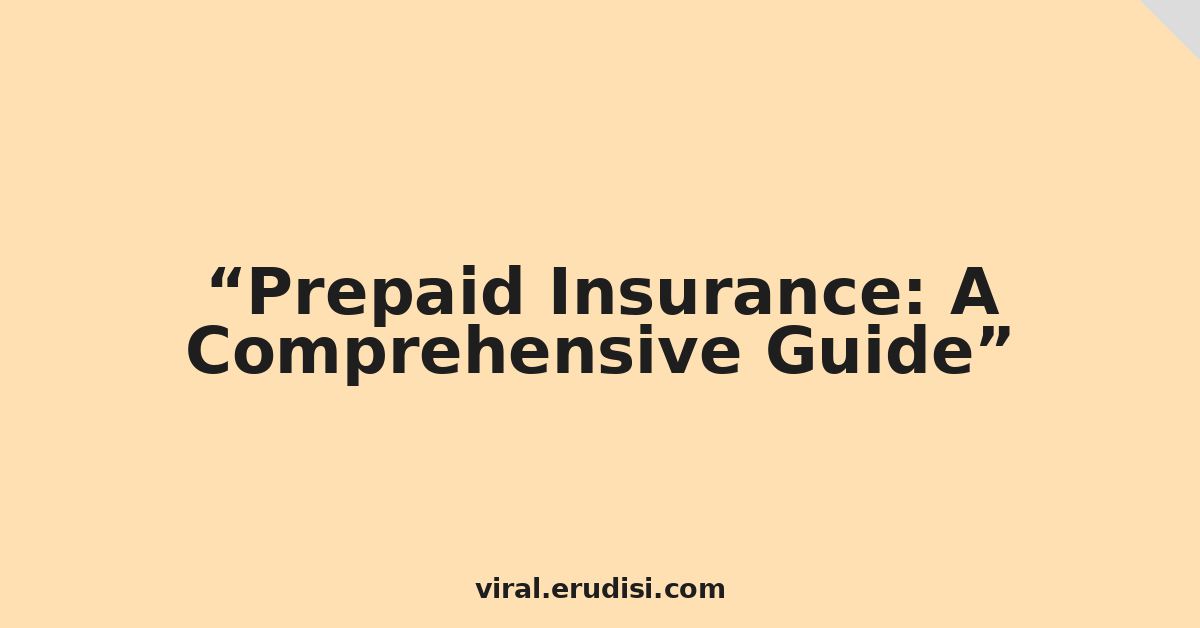Insurance is a critical part of financial planning for many people. It provides a safety net, protecting individuals and businesses from unexpected financial losses due to various events like accidents, illnesses, property damage, or legal liabilities. While traditional insurance models typically involve paying premiums on a regular basis, prepaid insurance offers a different approach. This comprehensive guide delves into the world of prepaid insurance, exploring its definition, types, benefits, drawbacks, and how it compares to traditional insurance models.
Hallo Reader viral.erudisi.com! Welcome to a deep dive into the often-overlooked world of prepaid insurance. This article aims to provide you with a clear understanding of this insurance model, its implications, and its potential benefits for different individuals and businesses. Whether you are a seasoned insurance buyer or just starting to explore your options, this guide will equip you with the knowledge you need to make informed decisions.
What is Prepaid Insurance?
Prepaid insurance, as the name suggests, involves paying for insurance coverage upfront, usually for a specific period. Instead of paying regular premiums, a single lump-sum payment is made at the beginning of the coverage period. This model contrasts with traditional insurance, where premiums are paid monthly, quarterly, or annually.
The concept of prepaid insurance is not new, but it has gained traction in certain sectors and for specific types of risks. It can be particularly attractive for individuals or businesses seeking to simplify their insurance payments, budget their expenses effectively, or secure coverage for a limited duration.
Types of Prepaid Insurance
Prepaid insurance can be found in various forms, catering to different needs and risk profiles. Here are some common types:
- Prepaid Funeral Insurance: This type of insurance covers the costs associated with a funeral, including services, burial or cremation, and other related expenses. The policyholder pays a lump sum or a series of payments to cover the funeral costs, ensuring that their loved ones are not burdened with these expenses after their passing.
- Prepaid Legal Insurance: Prepaid legal insurance provides access to legal services for a specified period. The policyholder pays a fee upfront to receive legal advice, document review, or representation in court. This type of insurance can be valuable for individuals or small businesses who may not be able to afford legal services on an hourly basis.
- Prepaid Health Insurance (Limited): In some cases, limited prepaid health insurance plans exist, particularly for specific services like dental or vision care. These plans may cover a set of services for a fixed fee, or provide discounts on services within a network of providers. Full-fledged prepaid health insurance is often more complex and regulated, and not as common as the other types listed.
- Prepaid Travel Insurance: Travel insurance can sometimes be offered as a prepaid option. Travelers might pay a lump sum before their trip to cover potential risks like trip cancellations, medical emergencies, or lost luggage.
- Prepaid Maintenance Contracts (Extended Warranties): While not technically insurance, extended warranties or maintenance contracts for products like appliances or vehicles often involve prepaid fees for repair or replacement services. These can be seen as a form of risk management, protecting against the costs of unexpected breakdowns.
- Prepaid Pet Insurance: Similar to human health insurance, pet insurance can sometimes be offered as a prepaid option, particularly for plans with a shorter duration.
Benefits of Prepaid Insurance
Prepaid insurance offers several potential advantages over traditional insurance models:
- Simplified Payment: One of the most significant benefits is the simplified payment structure. Policyholders make a single, upfront payment, eliminating the need to remember recurring premium payments. This can be especially appealing for those who prefer a more straightforward payment process.
- Budgeting Predictability: Prepaid insurance allows for predictable budgeting. Knowing the exact cost of insurance coverage in advance makes it easier to plan and manage finances, as there are no surprises with monthly or annual premiums.
- Cost Savings (Potentially): In some cases, prepaid insurance can be more cost-effective than traditional insurance, especially for short-term coverage needs. Insurers may offer discounts for upfront payments or bundle coverage options.
- Guaranteed Coverage Period: Prepaid insurance guarantees coverage for the specified period, providing peace of mind knowing that the policyholder is protected for a set duration.
- Convenience: The upfront payment process can be more convenient for some individuals, eliminating the need to deal with ongoing paperwork or payment reminders.
- Protection Against Premium Increases: With prepaid insurance, the premium is fixed for the coverage period. This protects policyholders from potential premium increases that might occur with traditional insurance due to factors like age, health, or market conditions.
Drawbacks of Prepaid Insurance
While prepaid insurance offers several advantages, it also has some potential drawbacks:
- Lack of Flexibility: Prepaid insurance is generally less flexible than traditional insurance. Policyholders may not be able to adjust their coverage or cancel the policy easily once the upfront payment has been made.
- Risk of Forfeiture: If the policyholder does not need to use the insurance coverage during the period, the upfront payment is essentially "lost." There is no refund for unused coverage, unlike traditional insurance where a portion of the premium may be returned if the policy is canceled early (depending on the policy terms).
- Limited Coverage Options: Prepaid insurance may have fewer coverage options compared to traditional insurance. Insurers may offer standardized packages with limited choices, which may not be suitable for everyone’s needs.
- Potential for Higher Upfront Costs: While prepaid insurance can be cost-effective in some cases, the upfront payment can be a significant financial burden, especially for individuals with limited financial resources.
- Inflation Risk: The value of the coverage may be eroded by inflation over the coverage period, particularly for longer-term policies. The benefits paid out may not be sufficient to cover the actual costs at the time of a claim.
- Complexity of Terms: The terms and conditions of prepaid insurance policies can be complex, and it is essential to carefully review the policy documents before making a purchase.
Comparing Prepaid Insurance to Traditional Insurance
The following table summarizes the key differences between prepaid insurance and traditional insurance:
| Feature | Prepaid Insurance | Traditional Insurance |
|---|---|---|
| Payment | Lump-sum upfront payment | Regular (monthly, quarterly, or annual) premiums |
| Payment Frequency | One-time | Recurring |
| Budgeting | Predictable, fixed cost for the coverage period | Less predictable, subject to premium changes |
| Flexibility | Less flexible; difficult to adjust or cancel | More flexible; policies can often be adjusted or canceled |
| Cost | Potentially cost-effective for short-term coverage | Potentially higher long-term cost |
| Risk | Loss of upfront payment if coverage is unused | Potential for premium increases; possible cancellation |
| Coverage Period | Fixed | Can be adjusted |
Who is Prepaid Insurance Suitable For?
Prepaid insurance can be a suitable option for individuals and businesses in the following situations:
- Those Seeking Short-Term Coverage: Individuals or businesses needing insurance for a specific, limited period (e.g., travel insurance, short-term legal assistance).
- Those Seeking Budget Predictability: Individuals who prefer to know the exact cost of their insurance coverage in advance and want to avoid the uncertainty of fluctuating premiums.
- Those Who Value Convenience: People who prefer a simplified payment process and want to avoid the hassle of recurring payments.
- Those Seeking Specific Services: Individuals or businesses who need access to specific services like funeral planning or legal advice, and find prepaid plans more convenient.
- Individuals on a Tight Budget: In some cases, prepaid plans might offer a more affordable option if the lump sum payment is manageable.
How to Choose Prepaid Insurance
When considering prepaid insurance, it’s essential to follow these steps:
- Assess Your Needs: Determine your specific insurance needs and the types of risks you want to cover.
- Research Providers: Research reputable insurance providers offering prepaid plans.
- Compare Coverage Options: Compare the coverage options and benefits offered by different providers.
- Review the Terms and Conditions: Carefully read the policy documents, paying close attention to the coverage limits, exclusions, and cancellation policies.
- Compare Costs: Compare the upfront costs and assess whether the prepaid plan is more cost-effective than traditional insurance for your needs.
- Consider the Coverage Period: Ensure that the coverage period aligns with your needs.
- Check Provider Reputation: Research the provider’s reputation and financial stability.
- Seek Professional Advice: Consult with an insurance professional or financial advisor to get personalized advice.
Conclusion
Prepaid insurance offers an alternative approach to managing risk and securing financial protection. It provides several benefits, including simplified payment, predictable budgeting, and the potential for cost savings. However, it also has drawbacks, such as limited flexibility and the risk of forfeiting the upfront payment.
The suitability of prepaid insurance depends on individual circumstances and needs. Before purchasing a prepaid insurance policy, carefully assess your needs, research providers, compare coverage options, and review the terms and conditions. Weigh the pros and cons, and consider whether prepaid insurance is the right choice for you. By making an informed decision, you can leverage the benefits of prepaid insurance to protect yourself and your assets effectively.

